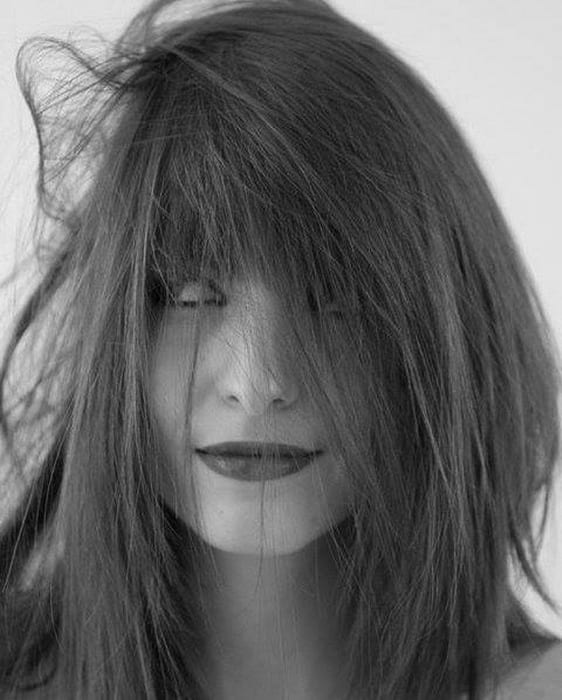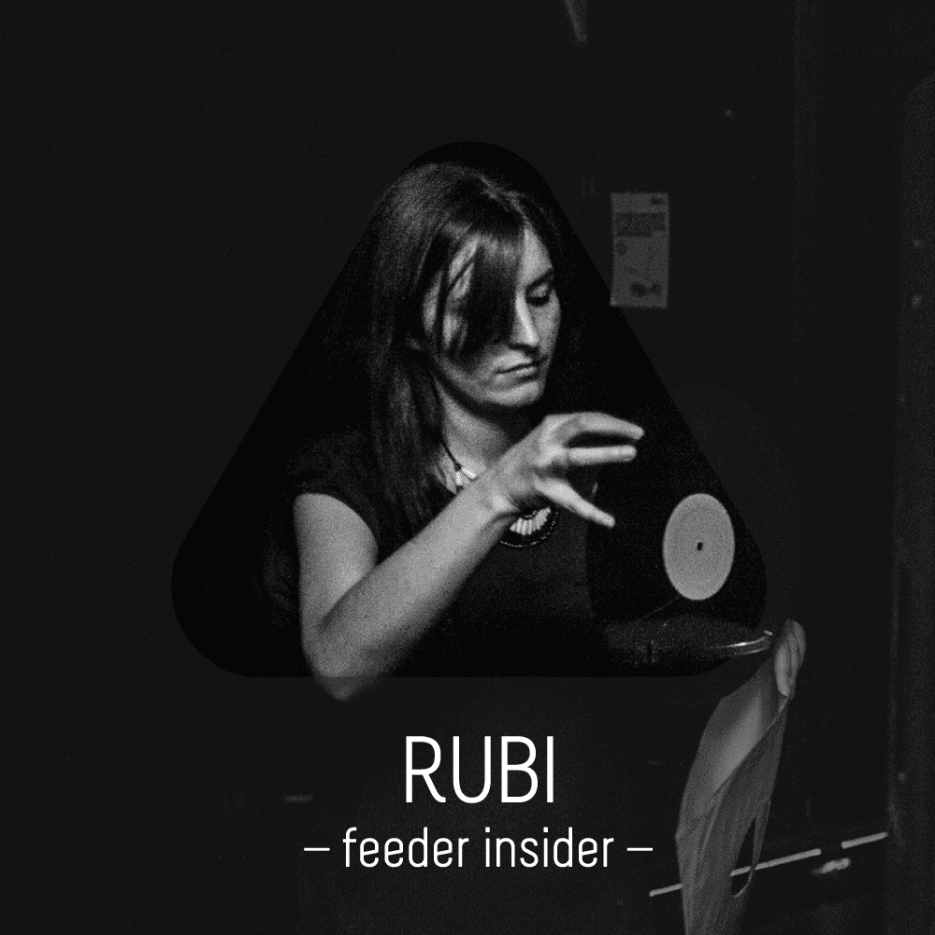feeder insider w/ Rubi
Whether it’s by hosting parties in hidden venues, digging for forgotten tracks or keeping a lookout for unsung DJs, it seems that being outside the norm is the norm for Rubi. The magenta end of the CMYKollektiv spectrum packs the thrill of discovering a priceless one-dollar record and the sunny hues of current home Barcelona in her winding sets – a blend you might recognize from her podcasts for Sonus Discis, MadPiano and, just last week, our very own sound series. Having been introduced to her on a phonic level, now it’s time to get on close terms; join us this week to discuss the underground culture and how to stay unconventional with Rubi.
keywords: unusual, secret, nomadic, colorful
Wednesdays are for… jazz concerts.
The perfect breakfast… consists of a big smoothie and chocolate cereal.
An online radio station I like listening to… is Etape.me!
Magenta makes me feel… blue.
I’d love to travel to… Iceland, Nicaragua or Myanmar.
The first record I bought… has a special place in my shelf. 🙂
My favourite shirt… has crazy patterns all over the place.
The best nights start… with good friends and mate tea.
When I want to unwind… I escape into nature and look at the sky.
3 festivals I dream of playing at… are Sunwaves, Sonus and Sustain-Release.

Violeta Năzare: Hello, Rubi! Lovely to have another voracious crate-digger on the insider series; you’re always on the search for hidden gems of timeless quality, so please share your knowledge: what are the ingredients for great tunes and what’s missing from today’s musical productions that sparked your interest for oldies but goldies?
Rubi: Independent of the ingredients, for me music is mainly about the way it makes you feel – if it hypnotises you to the extent that you forget your surroundings and get deep inside the tune, it’s a great piece! When I started collecting records, digging for oldies actually started off more as a financial necessity: I was hooked on records and wanted to put together my own collection, but was buying things on a student budget. It didn’t take me long to discover that if I just searched a bit harder, I could find great pieces of music for 1 or 2 euros and fill my shelf with a lot of dedication and comparably low financial investment.
By the time I gathered the first couple of records, I had become a fan of this way of making a collection – there is so much music around left to be discovered, that I think finding your own style by searching through the past 30 years of house music history is much more satisfying than just choosing your favourites among new releases coming out each week.
I definitely don’t hate on new music though; I’m happy to support friends of mine who are producing themselves – there’s a lot of talent around today, too!

V.N.: With technology so readily available, virtually anyone can give a stab at DJing – a perspective equally encouraging and disheartening. As more and more artists seem to strive for „underground” status, is underground becoming the new mainstream, or has the term in fact become synonymous with educated?
R.: I think part – part. The „underground” culture is definitely tightly linked with playing vinyl to me, I don’t think there are a large number of respected artists in this particular scene who don’t collect records. In this sense, I would equate the term with educated, since it requires a large amount of your time and energy to build something on your own. At the same time, there are obvious trends you can see in the underground in terms of the style people like – it has become fashionable to play breaks, electro etc. to the extent that this is becoming a bit mainstream now. I’ve always collected music that sounded a bit strange and irregular to me out of interest for things that capture my attention and are different from what I’ve heard during years of going out myself– when these things become „trendy” then it’s a strange feeling.
V.N.: You’re part of CMYKollektiv, a platform which promotes upcoming or underrated DJs. How did CMYKollektiv come together and what were some of the key moments you shared?
R.: We started the collective when we were living in Paris for one month about two years ago – we didn’t have anywhere to be over summer, so Eric (CMYK) and me decided to hang out there for a while and discover the local scene. We didn’t know many people in the city, but had been in contact with both Julien and Romain (the other two members) on the internet before. Once we arrived, we bought a set of really shit turntables and a horrible mixer just to have something to play with for one month, and the four of us got together regularly to spent evenings mixing on our terrace and discussing music.
And we discovered that while all of us were constantly searching for music, we were going in completely different directions, each one of us had their own musical identity. So we decided to form a collective with that concept – all four of us organizing a podcast and party series together, where we could take turns in inviting people we would like to support.
We made our first showcase in a slightly down at heel club in Paris, and somehow it filled up completely and people were dancing with us until the early morning… I think sharing that night was our first great moment together. We’ve invited a number of amazing artists since and it’s been a very nice journey meeting and getting to know all of them.
And the one thing I have learned in the process is how nice and accessible everyone is at the end. You’re always a bit intimidated when you write a message to some DJ or producer you’ve been following for some time, and in the end we’re all just a bunch of people who like music.
V.N.: Together with other fellow artists, you and CMYK also run Kommuna 2, the collective which brings fine electronic music to secret locations in Barcelona. What kind of places do you look for? How do you think the public’s expectations have evolved when it comes to partying?
R.: With Kommuna 2, we’re trying to bring people out to special places they haven’t seen before. The scene in Barcelona is rather small, such that most parties take place in only a handful clubs you see all the time. We wanted to offer something different, so we started looking for warehouses a bit outside of the center, or smaller privately run places that nobody had ever visited. In terms of expectations, Barcelona has a rather large scene of people who are into more „generic” tech house, and who love to attend the big events and rave in a large crowd. At the same time, an underground scene is emerging more and more, where people are happy to listen and dance to more challenging and interesting music, in smaller places and in a way that they can connect and meet with the ones surrounding them – we’re gathering the second part!

V.N.: I love that you host day parties too, what are the main differences between daytime events and nighttime parties, in terms of atmosphere and organization?
R.: From my experience, daytime events definitely attract a slightly different crowd than the ones at night. If you make an event in a beautiful warehouse space where people can enjoy the sun on the terrace, grab nice food and have calm conversations outside, it will cater to a much larger crowd than raving through a sweaty night. In terms of organization, day parties are definitely more stressful for all of us. The places we choose for those usually do not have a great deal of infrastructure in place, such that we take care of every step ourselves from hand-sewing decoration to buying beers (and even fridges!) to setting up the sound and visuals.
V.N.: Is hosting private events a reaction to Barcelona being such a hotspot for tourists? What are the main issues you’re trying to address by keeping your parties secret?
R.: It’s definitely a part of it. I think the best thing about our events is the crowd that has been following us. Since you need to know about the party we are hosting and the spot which it will take place in, there’s really not many random people coming over. We have been growing organically from the very first small event we organized in our house with a couple of friends, who have brought their friends to the next one, and then their friends etc… Over time this evolved into a great bunch of like-minded people, who are all into music, dancing through the whole night and getting to know each other. There’s quite a number of people who have become real friends of mine with time, and that have also connected among each other. Making events in secret locations instead of tourist hotspots has definitely contributed to the loyalty we’re receiving!

V.N.: We spent quite a few uplifting hours listening to your podcasts, where do you find the inspiration for your eclectic sets and what does the process of making a mix look like for you?
R.: I spend a large part of my day on Discogs, and always listen to music during my daytime job. I usually buy specific records when they catch my attention – if I stop doing whatever I’m doing in the moment to take a break and be fascinated by what I hear, I know I need to own the music. This has led to quite an eclectic collection of special and slightly weird tunes, which I’m still learning to make sense of! I think I’ve always liked music that sounds a bit outside of the usual.
When recording a mix, I like to prepare a stack of records before, from which I can then select in the moment. It usually takes me quite some time to find the first three tracks which set the mood for a podcast – from then on I just let it flow.
V.N.: You recently played in Guesthouse at the MadPiano 2-year anniversary. What are your thoughts on Bucharest and the city’s nightlife? Where will you be spinning your records next?
R.: I really, really loved the experience of playing at Guesthouse! I spent some time in Bucharest 2 years ago and lived there for a month during summertime after the Sunwaves festival – playing in this amazing place and hanging out with the great crew surrounding MadPiano has been a whole other level though. I think the public you find in Romanian clubs is probably among the most educated in the world and I’ve really met a lot of genuinely nice and interesting people. Also, DJing is still mainly a „male” profession and comes with being surrounded by men only most of the time – in Romania half of the crowd is composed of nice women who are happy to have a talk and share their own, often slightly different experiences, which I found quite amazing.
For the near future, we’ll have a number of events planned in Barcelona mostly – among them our big One Year Anniversary party of Kommuna 2 with 12 hours of music by Andrew James Gustav, Gwenan and a bunch of great local DJs!

V.N.: The insider series has been growing steadily and will soon reach the 100 mark, while the second feeder insider booklet is finally out in a limited edition of 500 copies, ready to travel to every corner of the world and shed light on motivation, process and perception in the arts. Did you read any of our interviews? Which part of the website would have you logging in again?
R.: Yes, of course! From the top of my head, I remember the interview with tINI and the early feature of Miss I in your series, I love her and her podcasts.
I really like the insider series and the interviews since they show you a personal side to every artist you’re hosting there.
Also, it’s great that you guys dedicate parts of your website also to food, film, design etc. and don’t limit yourselves to electronic music only – I easily get excited about all kinds of arts. 🙂
V.N.: Thank you for the delightful conversation, hope to hear you play at many more parties in Romania! Speaking of which, do you see yourself DJing at 40, 50, 60? What do you think would change with age?
R.: Haha, I’ve been thinking about that myself actually! In general, I have a number of different goals I’d like to accomplish by the time I’m 40, but I don’t think I will be any less into music, so why not!
I think what will definitely change with age is that you become very selective about events you play at – if you only want to dive into the nightlife every couple of weeks, you have to choose very carefully!
Words: Violeta Năzare
Photos: Rubi








Pingback: Listen to the F power feeder sound collection • Feeder.ro
Pingback: Descoperă noul magazin online feeder.ro | | Feeder.ro
Pingback: feeder insider celebrates International Women’s Day #BeBoldForChange | | Feeder.ro
Pingback: The adventures of the feeder insider bear in 2016 | | Feeder.ro
Pingback: The adventures of the feeder bear in 2016 | | Feeder.ro